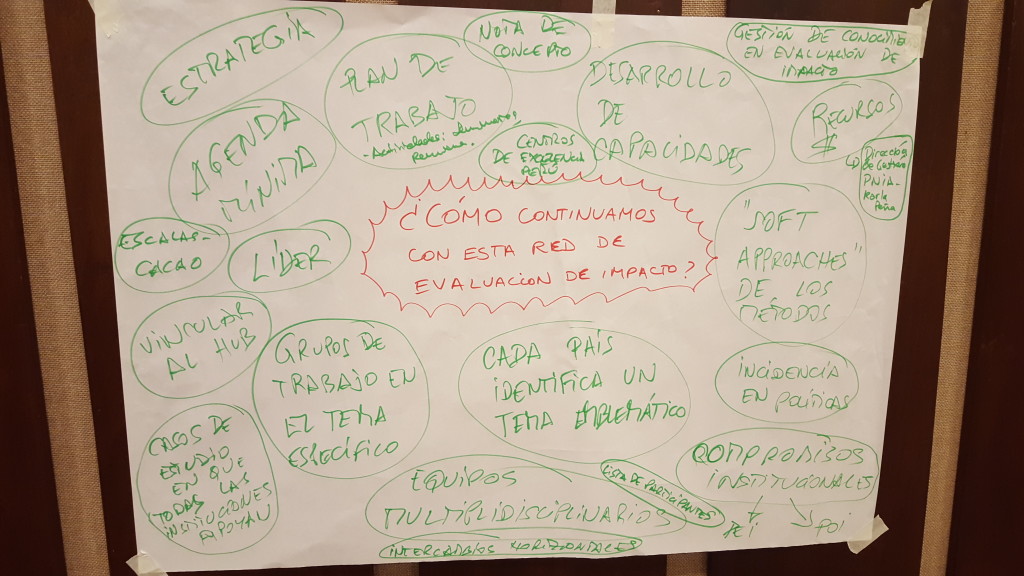A large number of public and private initiatives exist nowadays in Latin America which aim to promote innovation in the agricultural sector as a response to existing and future challenges on production systems and nutritional security. Some of these initiatives are financed by international credit institutions, like the World Bank, others by national governments, and others by private national or regional institutions. As a result, there is an increasing interest from implementing organizations to efficiently allocate resources so that their research and development objectives generate information to all stakeholders and contribute to policy decision making at the national level.
interest from implementing organizations to efficiently allocate resources so that their research and development objectives generate information to all stakeholders and contribute to policy decision making at the national level.
To answer this interest, the International Potato Center (CIP), the National Institute of Agrarian Innovation (INIA) of Peru and the Learning Alliance of Peru, in collaboration with the International Center of Tropical Agriculture (CIAT) and the International Food Policy Research Institute (IFPRI) organized a workshop on the “Impact assessment for priority setting in agricultural research” to share methods, experiences and results from ex-ante and ex-post impact assessments of agricultural research relevant to the Latin America and the Caribbean (LAC) region. The workshop, which was part of CIP’s implementation strategy of the Global Futures and Strategic Foresight project of the CGIAR Research Program on Policies, Institutions, and Markets (PIM) under Flagship 1, and the Innovative Value Chain Hubs and Platforms activity under Flagship 3 on Inclusive Value Chains and Efficient Trade, took place at CIP headquarters in the city of Lima, Peru in April 20-22, 2016.
During these three days, the campus of CIP became the field for the gathering of about fifty agricultural economists, social scientists and decision makers from agricultural research and development institutes in LAC, all with a common objective: to learn and share on how to set priorities and implement robust impact assessment in agricultural research. Participants covered a broad range of regional institutions: the National Agricultural Research Institutes of Peru (INIA), Colombia (CORPOICA) and Ecuador (INIAP), the Swiss Cooperation for Development in Bolivia (COSUDE) , the Peruvian Institute of Nutritional Research (IIN), the National Agronomic University of Peru in La Molina (UNALM), the Pontifical Catholic University of Peru (PUCP), the Peruvian Ministry of Finance, the Ministry of Agriculture, and finally NGOs such as ASOCAM from Nicaragua and PRISMA in Peru.
The main objective of the initiative was to increase participants’ awareness on the different state-of-the-art methods and recent results obtained in ex-ante and ex-post impact assessment studies which generate evidence on the effectiveness of research-based rural development interventions. The workshop was organized around three main thematic sessions on ex ante assessment, ex post assessment and other relevant topics that are not directly related to economics but are of high importance for impact assessment activities, like gender, nutrition, value chains and climate change. Core thematic presentations on methods, models and case studies were followed by plenary and group discussion sessions to answer two key questions:
- What type of research questions can be answered by each model/approach?
- Under which conditions can a model/approach be used?
One of the most interesting moments, according to most participants, was when the experience on impact assessment and priority setting gained by different R&D institutes over the years was shared. In this context, COSUDE (Bolivia), INIAP (Ecuador) and CORPOICA (Colombia) presented their institutional strategy for conducting such studies and also discussed problems, challenges and key questions that will rank high in their research agendas in the future, for example the identification of factors affecting adoption, the prioritization of research alternatives, and the estimation of impacts from multiple technologies simultaneously.
As an outcome of intensive learning and productive discussions, the participants decided to create a network of stakeholders working on impact assessment issues in LAC that will keep experts in contact with each other for effectively conducting impact assessment as part of LAC’s agricultural research and development agenda. This network could also be facilitated through the Innovative Value Chain Hubs in LAC which aims to bridge the gap between the creation of knowledge and its use for generating impact.
